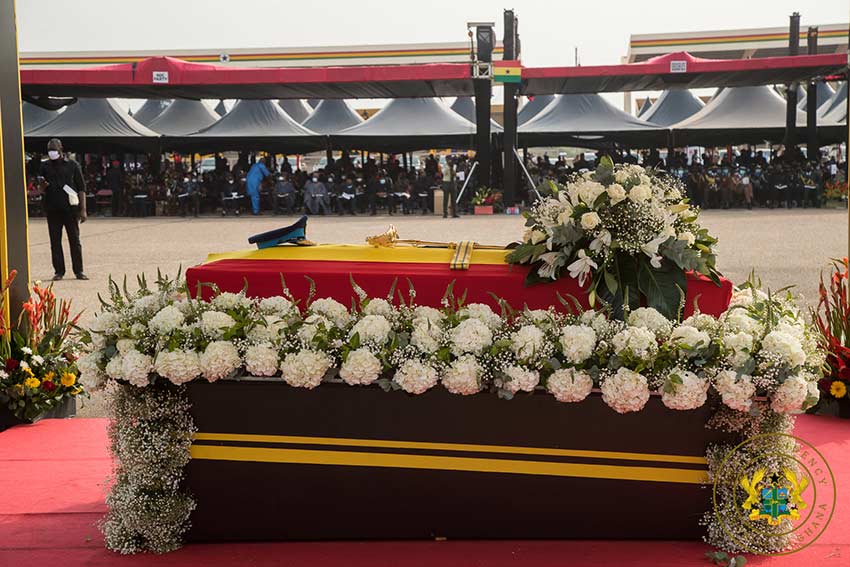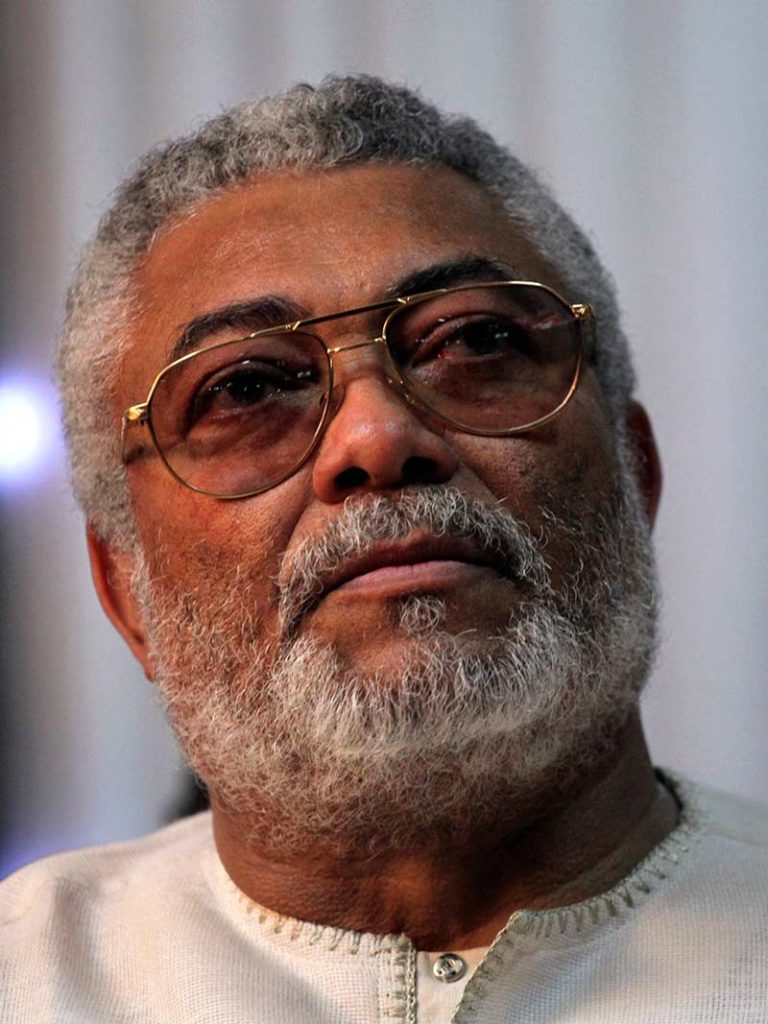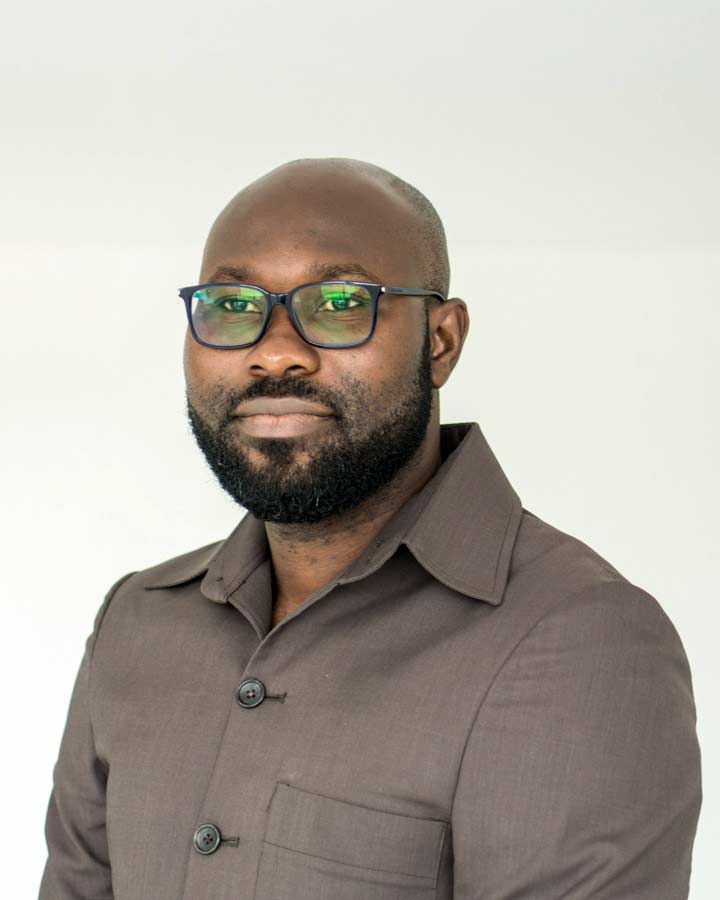A very colorful character, former Ghanaian president, Jerry John Rawlings, was given a four-day national funeral at the end of January 2021. In death as in life, controversy followed him: One of his close friends revealed in an emotional tribute at the funeral that Rawlings had told him only weeks before, after his mother’s death, that he had been so ill “two or three years ago” that he feared he might die before her. But when Africawatch reported his illness in May 2016, Rawlings promptly sued the magazine, claiming he had been defamed. Now after the tribute, Africawatch has been vindicated.
Former Ghanaian president Jerry John Rawlings, who died on November 12 at the age of 73, was buried with national honors after a ceremony at Independence Square in Accra on January 27, the last of four days of national mourning. He died at the Korle-Bu Teaching Hospital in Accra after what was described as a short illness, but some reports indicate that he succumbed to COVID-19.
Rawlings, a controversial figure, ruled the West African nation from 1981 to 1992 as a military dictator, and from 1993 to 2000 as an elected president. He also led a military junta for a few months in 1979. The abduction and brutal killing of three High Court judges, Justice Fred Poku Sarkodee, Justice Cecilia Koranteng-Addow, and Justice Kwadwo Agyei Agyepong, and a senior retired army officer, Major Acquah, under his watch on June 30, 1982, remained a blot on his legacy.

In paying tribute to Rawlings on the third day of his funeral, the current Ghanaian president, Nana Akufo-Addo, called him a “charismatic and fearless leader,” but admitted that “it was no secret that the relationship that existed between the two of us, right from the heady days of 1979, through to my brief period in exile … to my being elected in 2008 [as the] NPP presidential candidate, was one of open animosity. We did not see eye to eye.”
With time, however, things changed, Akufo-Addo said. “We came to see value in each other, and understood, to a very large degree, our respective perspectives.”
Jerry Rawlings’ widow, Nana Konadu Agyemang-Rawlings, said that the former president’s “gift of sharing knew no bounds,” and that he “never hesitated to help in the passing of laws to protect the vulnerable in society.”
Africawatch proved right
One of Rawlings’ close confidants, Martin Amidu, a former special prosecutor, praised him as a revolutionary leader with “indomitable courage, all pervasive-humanity, and love for freedom for every Ghanaian.”
Amidu said he had been “taken aback” last September 29, while expressing his condolences to Rawlings on the death of his mother at the age of 101. Amidu recalled that Rawlings had told him, “Chief, it is good it happened now. Chief, you people never knew. Two or three years ago, I was in bad shape with my health, and I feared I would go before her. At least I can now see her off.”

Amidu added: “With hindsight, I now realize that my dear and respected former PNDC chairman and former President Emeritus, Flight Lieutenant Jerry John Rawlings, was indeed giving us notice of his impending exit from his earthly assignments after the burial of his dear mother and bidding us goodbye.”
Interestingly, “two or three years ago” was shortly after the time in September 2016 when Rawlings sued Africawatch in an Accra High Court after it published an article in its May issue that said he was suffering from Parkinson’s disease and that his health was deteriorating.
It was a sympathetic story, with the cover headline “Now this man needs your prayers.” But Rawlings said it had defamed him, by falsely depicting him as “unwell and unfit for his much-sought-after international engagements.”
In his court papers, Rawlings claimed “that he is in good health and is fit to and does perform all his usual activities like driving, flying among others, and that the said publication may cause him to be denied the rights and privileges of a fit pilot including being denied admission into private flying clubs as he may be seen as being unfit.”
He filed these claims at the High Court at a time he knew he was in “bad shape” with his health, and Amidu’s heartfelt recollection that Rawlings said he feared he was going to die “two or three years ago” is a clear proof that the late president was suffering from a serious illness that “you people never knew” about, except Africawatch which published it.
During the trial of the alleged libel, corruption in Ghana’s judiciary reared its ugly head when a lawyer hired by Africawatch, John Darko from the Accra-based firm of Darko, Keli-Delataa & Co., who also teaches law at the Ghana Institute of Management and Public Administration in Accra, acted against the clear instructions of Africawatch and filed a dubious defense for the magazine without its consent and lied about it to the editor of the magazine, apparently to help Rawlings win the case.
The presiding judge, Justice Kweku Ackah-Boafo, was hostile to Africawatch. But the magazine fought back hard, and the case dragged on in the Ghanaian court system without any ruling on the substantive matter before Rawlings’ death.
A complicated legacy
Rawlings leaves a complicated legacy. A flight lieutenant in the Ghana Air Force, he first staged an unsuccessful military coup in May 1979. He was facing the threat of execution when his colleagues in the military, led by the then Capt. Kojo Boakye Djan, staged another coup on June 4, 1979, released him from jail, and put him at the head of the military government they formed, called the Armed Forces Revolutionary Council (AFRC).
Under his watch as the “chairman of the AFRC,” eight senior military officers, including three former heads of state, were publicly executed on June 16 and June 27, 1979, at a beach opposite the Military Academy at Labadi in Accra.

The three former heads of state were: General Ignatius K. Acheampong, Lt. Gen. Frederick W. K. Akuffo, and Lt. Gen. A. A. Afrifa. The other five executed were Maj. Gen. Emmanuel Utuka (a former Border Guard commander), Maj. Gen. Robert Kotei (a former chief of defense staff), Air Vice Marshal George Boakye (a former commander of the Ghana Air Force), Col. Roger Felli (a former commissioner for foreign affairs), and Commodore Joy K. Amedume (a former commissioner for labor). They were all accused of economic sabotage, abuse of power to amass wealth, and misuse of state funds.
On September 24, 1979, against the wishes of Rawlings, the AFRC turned power over to an elected government led by President Hilla Limann. But on December 31, 1981, Rawlings staged another coup to overthrow Dr. Limann’s government, and went on to rule Ghana for 19 straight years. He punctuated it with a change of clothes at the end of 1992, when he became an elected “civilian” president, and thus put down his military uniform.
From 1982, Rawlings ran the country as a socialist state, but within a couple of years, he switched to a market model, privatizing state-owned enterprises and attracting foreign investment.
During the 10 years between 1982 and 1992, Ghana saw the worst of Rawlings. It was a time of hundreds of extrajudicial killings, which forced many of his critics and opponents to flee into exile.
But, under pressure from the inter- national community, Rawlings grudgingly agreed to return the country to democratic rule in 1992, and held presidential and parliamentary elections that November 3. They were the first contested elections in Ghana since the June 18, 1979 vote won by Dr. Limann and his People’s National Party (PNP).
Controversy dogged Rawlings’ two electoral victories in 1992 and 1996, with the main opposition New Patriotic Party (NPP) boycotting his entire first term. But Rawlings managed to turn the nation around and improve its economy by an appreciable level. When he passed on power to the NPP’s John Agyekum Kufuor on January 7, 2001, Ghana was well on its way to economic recovery.
Loved and hated at the same time by many people, Rawlings will surely be missed in Ghanaian politics.